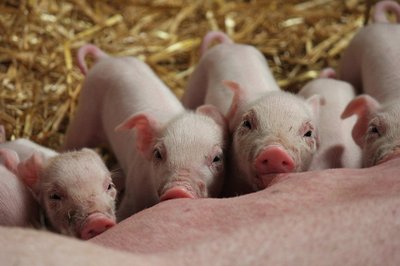Animal welfare: The prerequisite is vital and healthy piglets at birth and after weaning
The topic of "animal welfare" has been an important issue for pig farmers, not only since the European Green Deal, with numerous legal requirements and also, strategies of marketers or food retailers taking effect. In the case of piglets, criteria such as no tail docking or the space available in the housing are relatively easy to measure as objective criteria. In fact, more far-reaching measures are also foreseeable via legal regulations that relate to prevention in the area of animal health. The goals are to keep the animals healthy and to reduce the use of antibiotics.
In piglet production, animal welfare starts with the sow - we have already reported on the connection between pregnancy and farrowing elsewhere in this newsletter. Farrowing in particular, is a stress factor for sow and piglet, with a prolonged farrowing period - especially in large litters - increasing the number of stillborn piglets and reducing the vitality of the surviving piglets. Stress at birth reduces colostrum and milk production in the first days after farrowing. This poses an additional risk on the piglets, especially since breeding for high litter performance has indirectly reduced piglet birth weight and also increased competition between littermates.
A vital piglet quickly reaches the sow's udder and begins to suckle, which helps the newborn piglet maintain its body temperature and achieve a positive energy balance. Piglets with reduced vitality have often suffered oxygen deprivation at birth, which affects their performance later in life. The best prerequisite for a high number of piglets born alive and with vitality is to supplement the sow's diet with eubiotic lignocellulose (LC; OptiCell®) in order to intervene in a regulatory manner and shorten the farrowing period, as files from a recent trial show (Table 1).
Birth therefore has an important influence - if the piglets have a good start, this is also the best prerequisite for successful weaning. Here, the animals are faced with a new stress situation: parting from the sow, new "colleagues", switching to solid feed with vegetable components, with simultaneously reduced immune defences and a digestive tract that is not yet fully developed. Efficient feeding concepts keep piglets "eating", promote intestinal development and reduce diarrhoea. The eubiotic LC OptiCell® has a firm place in these concepts, not least in view of the reduction in antibiotic use and the elimination of therapeutic doses of zinc oxide. In a recent trial in Brazil, weaning piglets received either OptiCell® supplementation or antibiotics (antibiotic performance enhancer, AGP), in combination with 2,500 ppm zinc oxide (Table 2).
The results impressively show that OptiCell® was able to effectively support the piglets in the pre-starter and starter phase. The piglets showed high feed intake and gain, even without antibiotic and zinc oxide supplementation.
Both sows and piglets thus benefit from OptiCell® supplementation - not only in terms of health and performance, but also in the context of supporting animal welfare.


